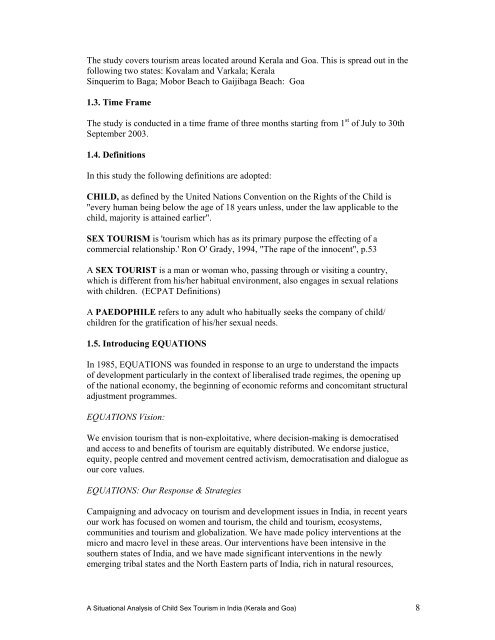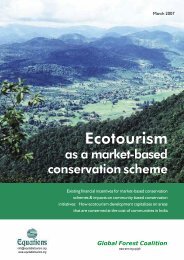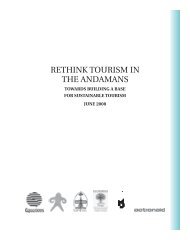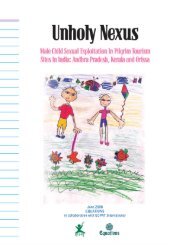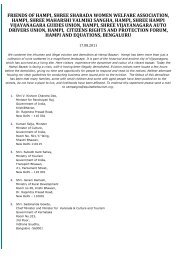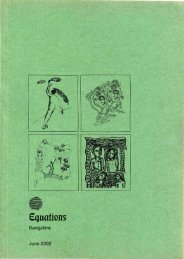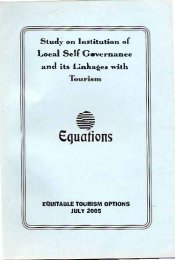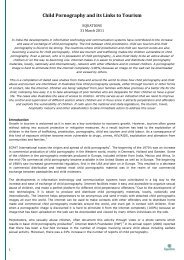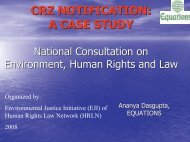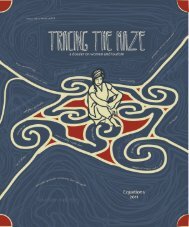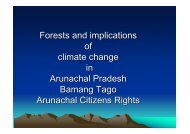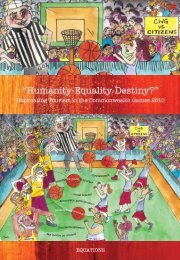A Situational Analysis of Child Sex Tourism- 30 December 2003 ...
A Situational Analysis of Child Sex Tourism- 30 December 2003 ...
A Situational Analysis of Child Sex Tourism- 30 December 2003 ...
You also want an ePaper? Increase the reach of your titles
YUMPU automatically turns print PDFs into web optimized ePapers that Google loves.
The study covers tourism areas located around Kerala and Goa. This is spread out in thefollowing two states: Kovalam and Varkala; KeralaSinquerim to Baga; Mobor Beach to Gaijibaga Beach: Goa1.3. Time FrameThe study is conducted in a time frame <strong>of</strong> three months starting from 1 st <strong>of</strong> July to <strong>30</strong>thSeptember <strong>2003</strong>.1.4. DefinitionsIn this study the following definitions are adopted:CHILD, as defined by the United Nations Convention on the Rights <strong>of</strong> the <strong>Child</strong> is"every human being below the age <strong>of</strong> 18 years unless, under the law applicable to thechild, majority is attained earlier".SEX TOURISM is 'tourism which has as its primary purpose the effecting <strong>of</strong> acommercial relationship.' Ron O' Grady, 1994, "The rape <strong>of</strong> the innocent", p.53A SEX TOURIST is a man or woman who, passing through or visiting a country,which is different from his/her habitual environment, also engages in sexual relationswith children. (ECPAT Definitions)A PAEDOPHILE refers to any adult who habitually seeks the company <strong>of</strong> child/children for the gratification <strong>of</strong> his/her sexual needs.1.5. Introducing EQUATIONSIn 1985, EQUATIONS was founded in response to an urge to understand the impacts<strong>of</strong> development particularly in the context <strong>of</strong> liberalised trade regimes, the opening up<strong>of</strong> the national economy, the beginning <strong>of</strong> economic reforms and concomitant structuraladjustment programmes.EQUATIONS Vision:We envision tourism that is non-exploitative, where decision-making is democratisedand access to and benefits <strong>of</strong> tourism are equitably distributed. We endorse justice,equity, people centred and movement centred activism, democratisation and dialogue asour core values.EQUATIONS: Our Response & StrategiesCampaigning and advocacy on tourism and development issues in India, in recent yearsour work has focused on women and tourism, the child and tourism, ecosystems,communities and tourism and globalization. We have made policy interventions at themicro and macro level in these areas. Our interventions have been intensive in thesouthern states <strong>of</strong> India, and we have made significant interventions in the newlyemerging tribal states and the North Eastern parts <strong>of</strong> India, rich in natural resources,A <strong>Situational</strong> <strong>Analysis</strong> <strong>of</strong> <strong>Child</strong> <strong>Sex</strong> <strong>Tourism</strong> in India (Kerala and Goa) 8


